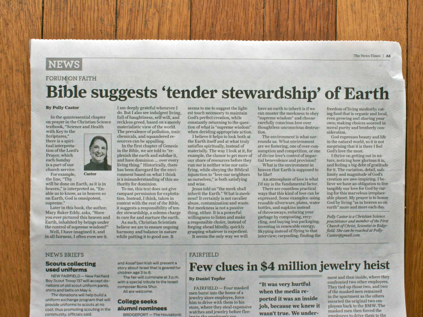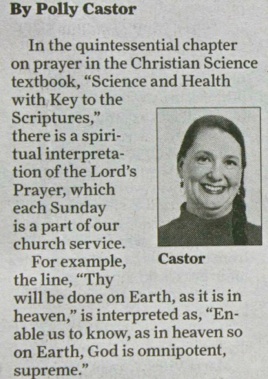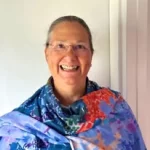
I am a regular contributor to the Danbury News Times Forum on Faith column, which is also picked up by the Connecticut Post and the Stamford Advocate. (Please note that the paper capitalized “earth” where I did not, for example in the Lord’s Prayer!) Anyway, you can read that version of the article online here or or mine below:
The Bible Suggests Tender Stewardship of the Earth
In the quintessential chapter on prayer in the Christian Science textbook,Science and Health with Key to the Scriptures there is a spiritual interpretation of the Lord’s Prayer, which each Sunday is a part of our church service.
For example, the line, “Thy will be done on earth, as it is in heaven,” is interpreted as, “Enable us to know, – as in heaven so on earth, – God is omnipotent, supreme.”
Later in this book the author, Mary Baker Eddy, asks, “Have you ever pictured this heaven and earth, inhabited by beings under the control of supreme wisdom?”
Well I have imagined it, and in all fairness, I often even see it. I am deeply grateful whenever I do, and hope to encourage more of that aligned response.
But I also see indulgent living, full of haughtiness, self-will, and reckless greed, based on a merely materialistic view of the world. The prevalence of pollution, toxic chemicals, and squandered resources can be appalling.
In the first chapter of Genesis in the Bible we are told to “replenish the earth and subdue it, and have dominion… over every living thing.” Historically, there has been disregard for the environment based on what I think is a misunderstanding of this authority for dominion.
To me, this text does not give rampant permission for exploitation. Instead, I think –taken in context with the rest of the Bible– it suggests a responsibility of tender stewardship, a solemn charge to care for and nurture the earth.
We are to insure ongoing harmony and balance in nature while putting it to good use. It seems to me to suggest the lightest touch necessary to maintain God’s perfect creation, while constantly returning to the question of what is “supreme wisdom” when deciding appropriate action.
I believe it helps to look both at the earth itself and at what truly satisfies, spiritually instead of materially. The clamor to get more of our share of resources before they run out is neither wise nor satisfying, while obeying the Biblical injunction to “love our neighbors as ourselves,” is both satisfying and wise.
Jesus told us “the meek shall inherit the earth.” What is meekness? It certainly is not caviler abuse, contamination and waste. But meekness is not a passive thing either. It is a powerful willingness to listen and make a responsible choice, instead of forging ahead blindly, quickly grasping whatever is expedient.
It seems the only way we will have an earth to inherit is if we can muster the meekness to obey “supreme wisdom” and choose carefully conscious love over thoughtless unconscious destruction.
The environment is what surrounds us. What environment are we fostering: one of over-consumption and competition, or one of divine Love’s control of impartial benevolence and provision? What is the environment in heaven that earth is supposed to be like? An atmosphere of Love is what I’d say is the fundamental factor.
There are countless practical ways that this kind of love can be expressed. Try these for starters: using reusable silverware, plates, water bottles, and napkins instead of throwaways; reducing your garbage by composting, recycling, and buying less packaging; investing in renewable energy; skyping instead of flying to that interview; carpooling; finding the freedom of living modestly; eating food that is organic and local, even growing and sharing your own; making choices sourced in moral purity and brotherly consideration.
God expresses beauty and life in the natural world so it is not surprising it is there I feel God’s love the most. I thrive on getting out in nature, noticing how glorious it is, and feeling a big debt of gratitude for it. The variation, detail, sublimity and magnitude of God’s creation are awe-inspiring. I believe we have an obligation to live tangibly our love for God by caring for this marvelous irreplaceable planet.
My prayer is to honor God by living “as in heaven so on earth” more and more each day.
By Polly Castor, a Christian Science Practitioner, and member at First Church of Christ, Scientist, Ridgefield, CT. She can be reached at PollyCastor@gmail.com







